Celebrity endorsement quotes tap into your subconscious using authority, emotional stories, and social proof to influence your choices. When celebrities appear authentic and relatable, they boost your trust and attachment to a product. Repetition, subtle language cues, and associations with aspirational identities make their messages stick and feel more convincing. If you want to understand how these hidden psychological tricks shape your perceptions and decisions, there’s more beneath the surface waiting for you.
Key Takeaways
- Celebrity authority and credibility increase trust and influence consumer purchasing decisions through perceived expertise.
- Authentic storytelling and emotional connection foster loyalty and deepen audience engagement.
- Repetition and social proof amplify brand trust, familiarity, and herd behavior, boosting product appeal.
- Framing techniques and language choices shape perceptions subconsciously, emphasizing benefits and positive outcomes.
- Implicit biases and stereotype cues reinforce aspirational self-image, motivating consumers to align with the endorsed identity.
The Power of Authority and Credibility
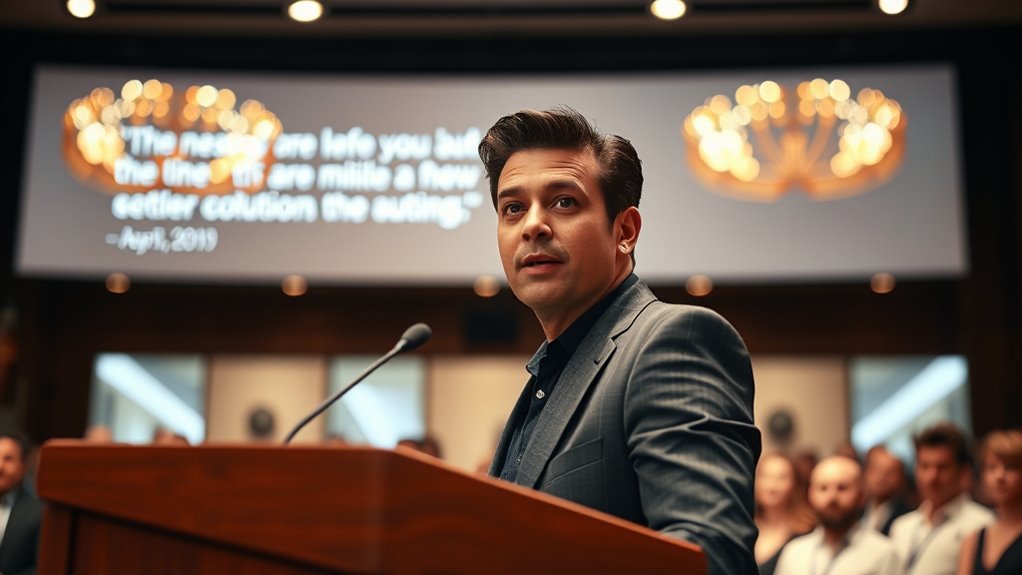
The power of authority and credibility plays a crucial role in celebrity endorsements because consumers are more likely to trust recommendations from figures they perceive as knowledgeable or reputable. When a celebrity has a strong authority perception, it enhances their influence, making their endorsement appear more genuine. This credibility enhancement boosts consumer confidence in the product or service being promoted. You naturally rely on authority figures because their expertise or status lends weight to their opinions. As a result, endorsements from well-respected celebrities can considerably impact your purchasing decisions. Recognizing this, marketers leverage celebrity authority to strengthen their message’s trustworthiness. Ultimately, the perceived authority of a celebrity shapes how persuasive their endorsement feels, reinforcing your belief in the product’s value.
Emotional Appeal and Personal Connection

You can build trust with your audience by showing authenticity in your messages, making your brand feel real and relatable. When your endorsement connects personally, it resonates more deeply and feels relevant to their lives. By eliciting genuine emotional responses, you create a stronger bond that influences perceptions and decisions. Incorporating emotional appeal into your messaging can significantly enhance your connection with consumers.
Building Trust Through Authenticity
Authenticity plays a crucial role in building trust when celebrities endorse products or brands. You can see it through genuine storytelling that feels honest and relatable. When celebrities share behind-the-scenes insights or personal experiences, it deepens the emotional connection with their audience. This transparency shows they truly believe in what they’re endorsing, which increases credibility. Consumers are more likely to trust endorsements when they sense sincerity, not just scripted lines. By revealing authentic moments or struggles, celebrities demonstrate vulnerability, making their endorsement seem more personal. This genuineness fosters loyalty and trust, encouraging you to see the product as more than just an advertisement. Ultimately, genuine storytelling rooted in real experiences makes endorsement quotes resonate on a deeper emotional level. Additionally, understanding the best anime movies and animated films that touch hearts can help brands craft more relatable and heartfelt endorsements.
Creating Personal Relevance
When celebrities share personal stories or experiences, they create a powerful emotional connection that resonates with their audience. This technique, known as personal storytelling, makes the endorsement feel genuine and relatable. By revealing their struggles, triumphs, or everyday moments, celebrities establish a sense of authenticity, fostering personal relevance. Their stories often tap into cultural resonance, reflecting shared values, traditions, or societal norms that deepen the bond. When you see a celebrity connecting on a personal level, it’s easier to see yourself in their story, making the message more impactful. This emotional appeal shifts the focus from the product itself to the meaningful experience or value it represents, encouraging you to form a deeper, more personal attachment to the endorsement. Additionally, understanding the psychology behind endorsement quotes can help you recognize how emotional appeal influences your perceptions and decisions.
Eliciting Emotional Responses
How do celebrities forge a powerful emotional bond with their audience? They use visual storytelling to evoke feelings that resonate deeply. When a celebrity shares authentic moments or personal stories, it creates a sense of intimacy. Tone consistency across their messages reinforces trust and emotional connection. This coherence helps their audience feel understood and valued, making the endorsement more impactful. By aligning their visuals and messaging tone, celebrities elicit genuine emotional responses. These responses foster loyalty and inspire action. When you see a celebrity appear relatable, sincere, and consistent, it amplifies your emotional engagement. Ultimately, it’s this combination of visual storytelling and tone consistency that transforms a simple endorsement into a meaningful, memorable experience. Maintaining authenticity in messaging is essential for sustained emotional bonds with followers.
Social Proof and Herd Behavior
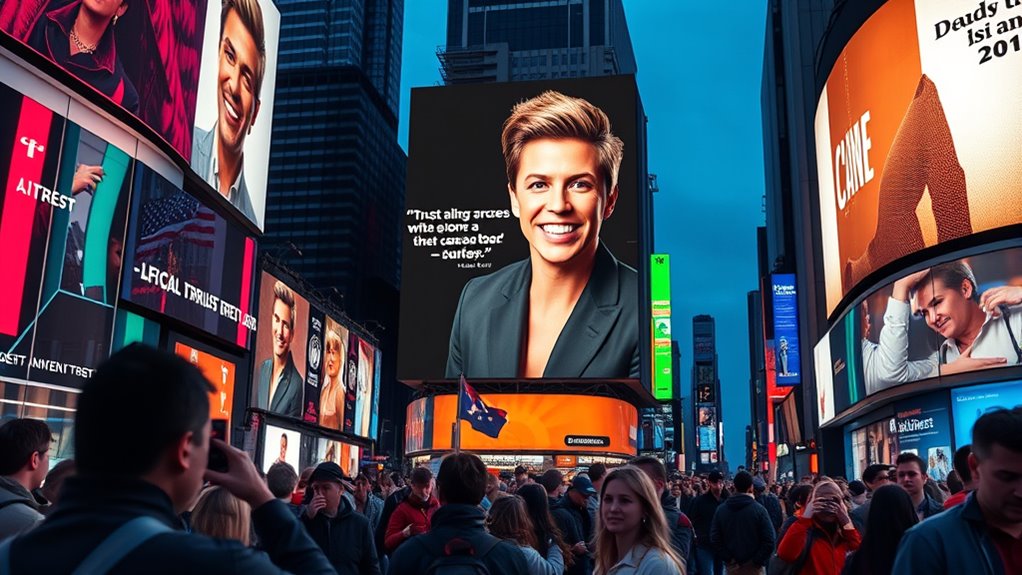
Social proof and herd behavior play a crucial role in celebrity endorsements because people tend to look to others’ actions when making decisions. You’re likely influenced by the crowd’s reactions and the idea that if many others support a product, it must be good. This is a core aspect of endorsement psychology, where celebrity influence amplifies social proof. When a famous personality endorses a brand, it signals to you that the product is trustworthy or popular, encouraging you to follow suit. Herd behavior kicks in, making you want to align with the majority. This dynamic drives consumer choices, as you’re subconsciously swayed by the perceived approval of others, leveraging the power of social proof to boost a brand’s credibility and appeal. Additionally, understanding how Kia Tuning enhances vehicle performance can influence consumer perceptions of quality and innovation, further strengthening endorsement effects.
The Use of Language and Framing Techniques
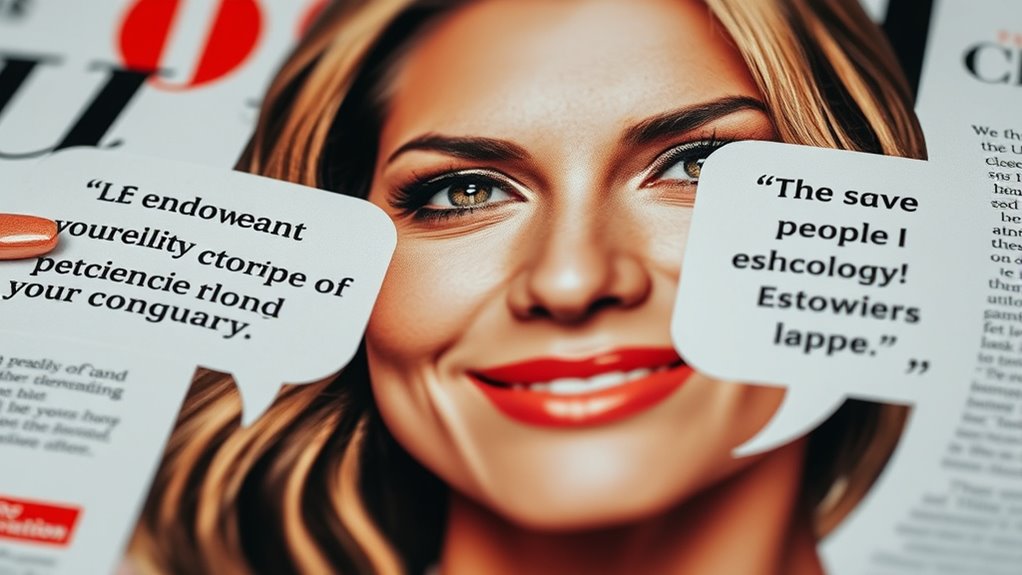
The language and framing techniques used in celebrity endorsements shape your perception of a product by highlighting its benefits and creating emotional connections. They often employ metaphorical language to make features more vivid and relatable, helping you visualize the experience or transformation the product offers. Framing techniques also play a vital role by presenting information in a way that emphasizes positive outcomes, such as portraying a product as a key to success or happiness. This combination influences your emotional response, making you associate the celebrity’s endorsement with desirable qualities. By carefully selecting words and framing messages, marketers craft perceptions that seem natural and compelling, guiding your attitudes unconsciously. Additionally, understanding personality traits can enhance the effectiveness of these techniques by tailoring messages to resonate with different audiences. Ultimately, these techniques subtly steer your decision-making process without you even realizing it.
The Role of Aspirational Identity

Your self-image influences how you connect with celebrity endorsements that reflect your aspirations. When brands align with your ideal identity, they motivate you to see yourself as more confident or successful. This strategy links your aspirations with the product, making the message more compelling. Additionally, understanding the subtle psychological tactics behind these endorsements can deepen your awareness of how marketing influences your perceptions.
Aspiration and Self-Image
Aspirational identity plays a powerful role in celebrity endorsements because it taps into your desire to become a better or more desirable version of yourself. When you see a celebrity associated with a product, it connects to your dreams and ambitions, making you believe that using it can bring you closer to that ideal self. This influences your self perception and boosts your confidence, as you imagine embodying qualities you admire. The endorsement suggests that achieving your goals is possible with the right choices, inspiring you to endeavor for personal growth. It’s not just about the product; it’s about visualizing a future where you’re more successful, confident, and fulfilled—transformations that resonate deeply with your aspirations. Understanding the role of aspirational identity can help you recognize how endorsements influence your self-image and decision-making.
Identity Alignment Strategies
How do celebrities create a seamless connection between their image and the products they endorse? They use identity alignment strategies that emphasize celebrity authenticity, making their endorsements feel genuine. By consistently showcasing traits that match the product’s image, they build endorsement consistency, reinforcing trust with their audience. These celebrities often embody an aspirational identity that fans admire and want to emulate. When their public persona aligns with the brand’s values, it feels natural, not forced. This seamless integration helps fans see the endorsement as a reflection of the celebrity’s true self, boosting credibility. Additionally, understanding the importance of visual branding enhances the effectiveness of these strategies. Ultimately, the key lies in maintaining a consistent message that resonates with the audience’s aspirations, creating a powerful link between the celebrity’s identity and the product.
Subtle Persuasion and Anchoring Effects
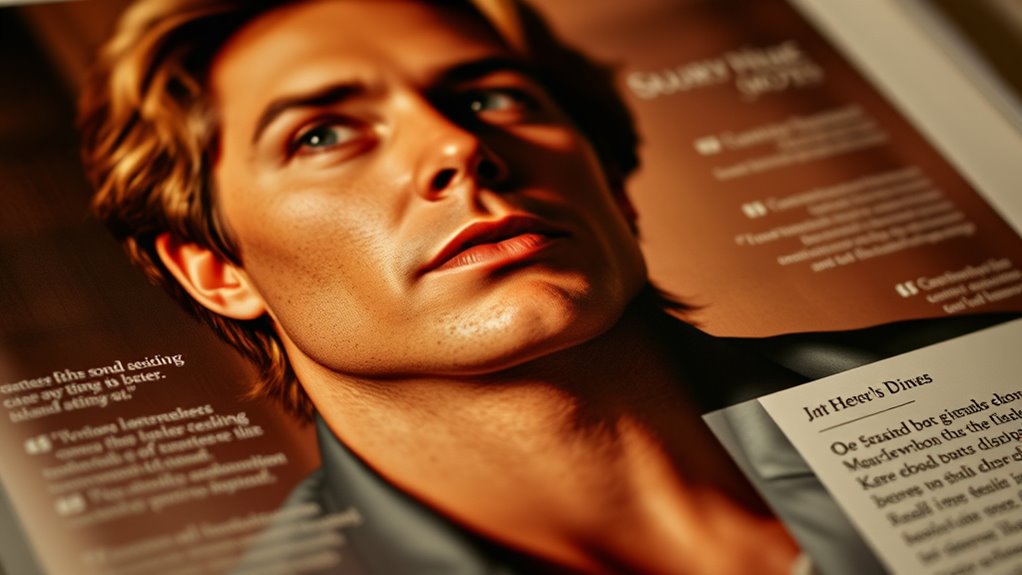
Have you ever wondered how celebrities subtly influence your perceptions without you even realizing it? Subtle persuasion often works through mirror reflection, where you unconsciously see yourself in the endorsement, making the message feel personal. Anchoring effects come into play when celebrities set a reference point—like a high price or luxury status—that influences your judgments. Implicit cues, such as a celebrity’s confident tone or strategic placement in ads, quietly steer your decisions without overtly commanding attention. These techniques tap into your subconscious, shaping your preferences through small, almost invisible hints. Recognizing these subtle cues and anchoring effects, which are closely related to the concept of cost behavior analysis, allows you to become more aware of how your perceptions are influenced, enabling you to make more informed choices rather than falling prey to hidden persuasion.
Implicit Biases and Stereotype Reinforcement
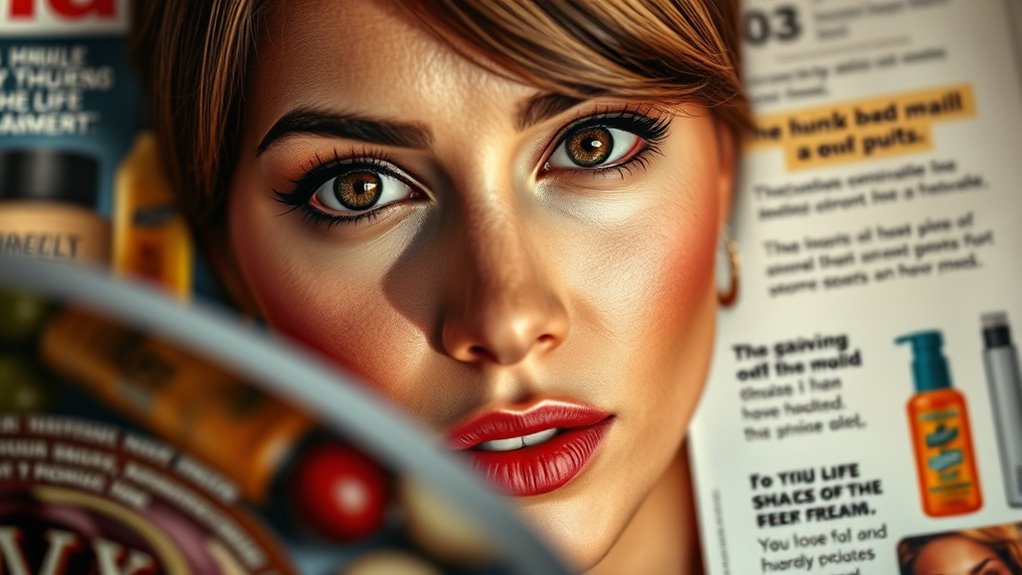
Implicit biases and stereotypes often influence how you interpret celebrity endorsements, even when you’re unaware of it. You might unconsciously pick up on implicit assumptions that shape your perception of a celebrity’s message. Stereotype cues, like their appearance or background, can reinforce existing beliefs, making you more likely to accept or dismiss the endorsement based on these biases. For example, if a celebrity fits a certain stereotype, you may assume they genuinely believe in a product, even if they’re simply endorsing it for financial reasons. These automatic associations operate below your conscious awareness, subtly guiding your attitudes and decisions. Recognizing how implicit assumptions and stereotype cues influence you helps you become a more critical consumer of celebrity-endorsed messages.
The Impact of Repetition and Familiarity
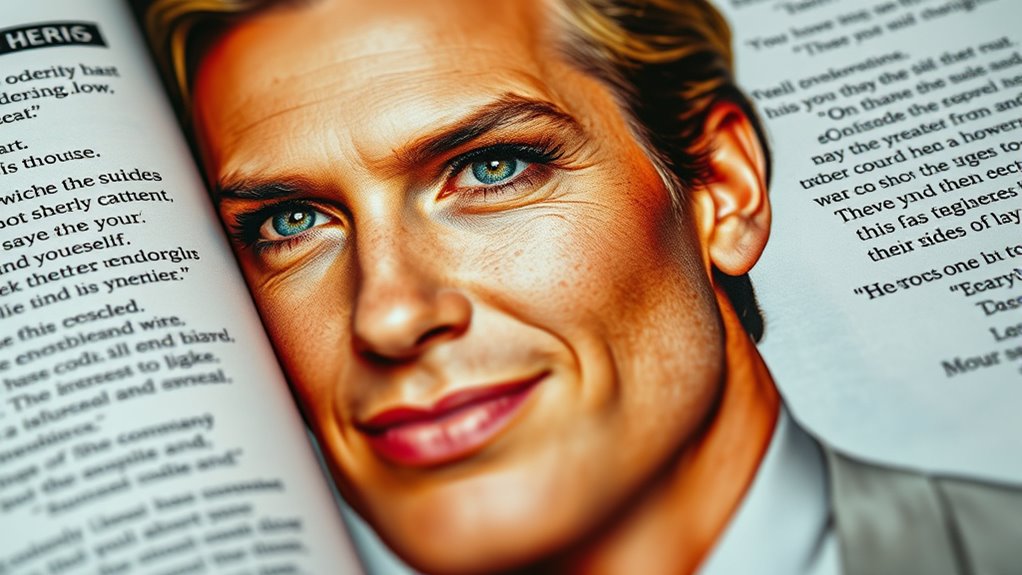
Repeated exposure to a celebrity’s endorsement can substantially shape your perceptions, often making the message seem more trustworthy or appealing simply because it feels familiar. When you see the same endorsement multiple times, it reinforces your memory of the product, boosting consumer recall. This repeated familiarity builds a sense of comfort and trust, encouraging brand loyalty over time. As a result, you’re more likely to choose that product because it feels ingrained in your mind from the repeated messaging. Brands leverage this psychological effect by ensuring their endorsements are seen often, knowing that repetition makes their message stick. Ultimately, familiarity through repetition not only influences your immediate perception but also cultivates ongoing loyalty to the brand.
Frequently Asked Questions
How Do Celebrity Endorsement Quotes Influence Subconscious Decision-Making?
Celebrity endorsement quotes influence your subconscious decision-making by creating a strong emotional appeal, making you feel more connected to the brand. When you see a trusted celebrity endorsing a product, it boosts your brand loyalty without you even realizing it. This subconscious influence taps into your emotions, encouraging you to choose that brand over others, often based on the positive feelings associated with the celebrity, rather than purely logical reasons.
Can Endorsements Reinforce Societal Stereotypes Unintentionally?
Did you know that 65% of people believe media influences reinforce cultural stereotypes? When you see endorsements, you might not realize they can unintentionally strengthen societal stereotypes. Media influence, including celebrity endorsements, often perpetuates cultural stereotypes by showcasing specific beauty standards or roles. This subtle reinforcement shapes your perceptions and expectations, making it important to be critical of the messages conveyed through these endorsements to avoid reinforcing harmful stereotypes unknowingly.
What Psychological Biases Are Most Exploited in Celebrity Quotes?
You’re focusing on which psychological biases celebrities exploit in their quotes. They often use emotional appeals to connect with your feelings and create a sense of urgency or trust. Authority bias is also common, as you’re more likely to believe and follow a celebrity’s advice because they’re perceived as experts or influential figures. These tactics make their messages more persuasive by tapping into your subconscious biases.
Do Repeated Endorsements Create Long-Term Consumer Trust?
Oh, sure, keep seeing that same celebrity tout the same product, and suddenly you’re convinced it’s the best thing ever. Repeated endorsements can actually build trust development and foster brand loyalty—until the celebrity’s scandal erupts, and so does your faith. But, on the bright side, consistency does help solidify positive perceptions, making it easier for you to stick with a brand long-term—even if your skepticism is just hiding behind a smile.
How Do Language Choices Shape Consumer Perceptions Subtly?
You might not realize it, but language choices subtly shape how consumers perceive products. Through linguistic framing, words can highlight benefits or create associations that influence your feelings and opinions. Emotional appeal plays a key role, as carefully chosen language evokes specific sentiments, making you more likely to trust or desire a product. These small shifts in language guide your perception without you even noticing, influencing your decisions effortlessly.
Conclusion
Understanding the psychology behind celebrity endorsements reveals a web of subtle influences guiding your choices. These quotes act like a magnet, pulling at your emotions, biases, and desire for belonging. Recognize how language, repetition, and social proof shape your perceptions—like a river carving through stone. By shining a light on these hidden forces, you gain the power to make more conscious decisions, steering clear of being a puppet in the grand puppet show of marketing.
Joy, as our Editor in Chief, ensures the highest standard of content. Her talent in writing is complemented by her attention to detail and passion for literature and culture. Joy’s expertise and love for the English language shine through in her editorial work, making each piece a testament to quality and clarity.









